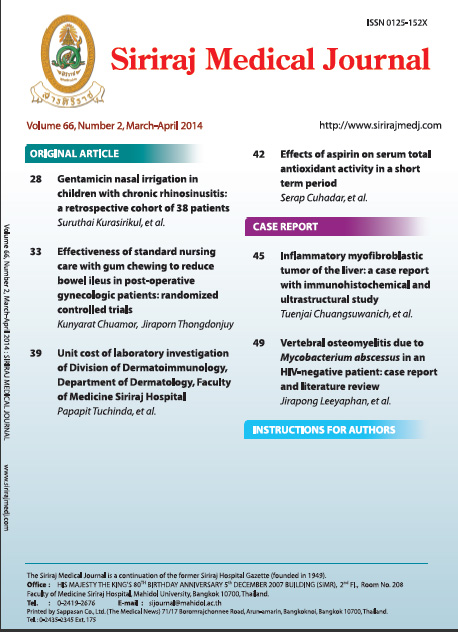Gentamicin Nasal Irrigation in Children with Chronic Rhinosinusitis: A Retrospective Cohort of 38 Patients
Abstract
Background: Chronic rhinosinusitis is a common problem in patients with allergic rhinitis or antibody deficiency. Topical antibiotic therapy for chronic sinusitis has been shown to improve symptoms and quality of life in adults. The objective of this study was to describe the clinical outcomes after using gentamicin nasal irrigation in children with recalcitrant rhinosinusitis.
Methods: This retrospective cohort was performed in children with chronic rhinosinusitis who received gentamicin nasal irrigation from January 2005 through February 2011. The clinical symptoms, frequency of sinusitis, hospitalization and antibiotic treatment due to rhinosinusitis between pre- and during treatment of gentamicin nasal irrigation were compared.
Results: Thirty-eight patients (23 males) with the mean age of 12.7±1.1 years were recruited. The most common comorbidities were allergic rhinitis and antibody deficiency. After the initiation of gentamicin nasal irrigation, there were significant improve- ments in nasal congestion, rhinorrhea, itching, post nasal drip, purulent nasal discharge, halitosis, chronic cough, sneezing and anosmia (p<0.05). The frequency of sinusitis and the frequency of antibiotic treatment were significantly decreased after the treatment (p≤0.001). Hospitalization due to sinusitis exacerbation and number of intravenous antibiotic infusions also significantly decreased (p<0.05). The success rate of treatment was 78.9% (CI 0.64-0.89). There was no reported complication. Conclusion: This study showed that gentamicin nasal irrigation was useful in the reduction of rhinosinusitis symptoms and hospitalization in children with chronic rhinosinusitis without reported complication.
Keywords: Chronic rhinosinusitis, gentamicin nasal irrigation, children with chronic rhinosinusitis, treatment of chronic rhinosinusitis
Siriraj Med J 2014;66:28-32
Downloads
Published
How to Cite
Issue
Section
License
Authors who publish with this journal agree to the following conditions:
Copyright Transfer
In submitting a manuscript, the authors acknowledge that the work will become the copyrighted property of Siriraj Medical Journal upon publication.
License
Articles are licensed under a Creative Commons Attribution-NonCommercial-NoDerivatives 4.0 International License (CC BY-NC-ND 4.0). This license allows for the sharing of the work for non-commercial purposes with proper attribution to the authors and the journal. However, it does not permit modifications or the creation of derivative works.
Sharing and Access
Authors are encouraged to share their article on their personal or institutional websites and through other non-commercial platforms. Doing so can increase readership and citations.










